Table of Contents[Hide][Show]
High blood sugar in the morning is a popular topic – it seems to stump many people.
For instance, a while back I had a client sending me her blood sugar charts every few days and on those charts she always made some notes if she had questions.
Every time she sent them through, I noticed she had 3 big question marks (???) against her morning readings. And on another morning when her morning blood sugar levels were high at 160 mg/dl (or 8.9 mmol/l).
She had written:
I don’t understand. 97 mg/dl (or 5.5mmol/l) last night when I went to sleep. I didn’t eat anything because I didn’t feel well. Humm…
Here on the DMP blog we often receive comments like:
- Why is my reading in the morning higher than when I go to sleep?
- My morning numbers are always high no matter what I do. When I say high I mean 190. I am so frustrated and don’t understand why.
- Why does my blood glucose spike in my sleep giving me a high reading in the morning when I watch all I eat at dinner time?
Do these morning situations sound familiar to you? Are you constantly questioning why you have high blood sugar in the morning?
Logically we’d think that it should be at its lowest in the morning, right?
Well don’t panic, there is a reason for it, so let’s explore why morning blood sugar is often higher. And then we’ll discuss what you can do to help lower blood sugar in the morning.
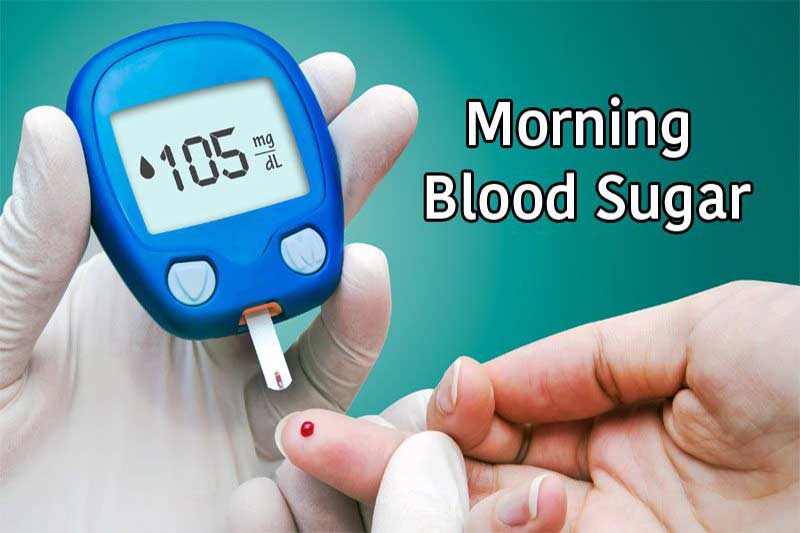
Why Is Blood Sugar High In The Morning?
Although it would seem logical that your body would have the lowest blood glucose level in the morning, this often isn’t the case for the following 6 reasons.
1. Glucose Happens 24/7
All the cells in the body need glucose to fuel their function, even when we sleep.
Therefore the liver can produce sugar (glucose) by breaking down body stores (glycogen), a process called glycogenolysis. The liver can also manufacture sugar (glucose) from amino acids (proteins) in a process called gluconeogenesis.
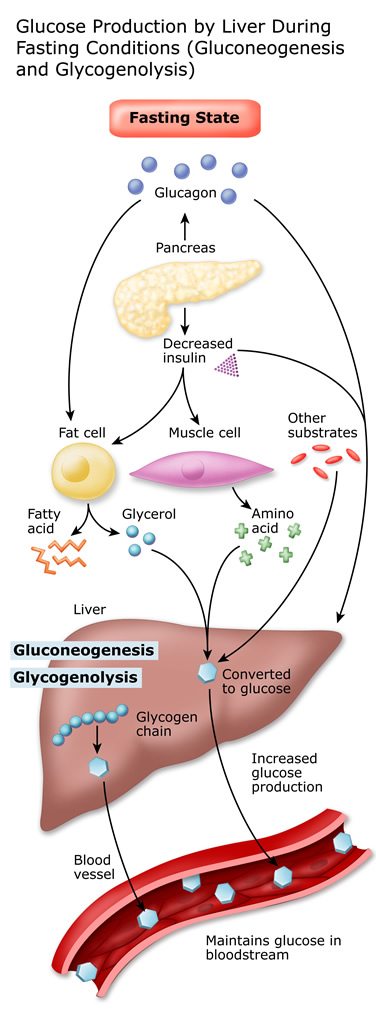
Image courtesy: University of California
These processes ensure the body and brain have adequate fuel so they can continue to go about their functions.
The point is: glucose production in the body will still occur when you don’t eat or if you skip a meal because the body always maintains glucose at a certain level in order to function.
2. Hormones Raise Blood Glucose (the Dawn Phenomenon)
Around 3-4 am each morning, there are a collection of counter regulatory hormones that are signaled in the body: glucagon, epinephrine, growth hormone, and cortisol, which result in a rise in blood sugar.
This change in hormones occurs to stimulate our awakening, to get us moving and to give us energy. This is referred to as the Dawn Phenomenon or Dawn Effect.
This is in fact a ‘normal’ response. This occurs in everyone, diabetic or not.
However, if you have diabetes or prediabetes there is one additional factor that impacts both the overnight glucose production and the rise in glucose with cortisol, and that is decreased insulin production or decreased utilization of insulin.
3. Decreased Insulin Production or Utilization of Insulin
Because most people with type 2 diabetes and prediabetes have either decreased insulin levels or decreased utilization of insulin, there is either not enough insulin being produced to bring the rising blood sugar levels down, even during the night when you are sleeping.
In this scenario, your body is still producing glucose, your hormones are still doing their thing, but insulin production is low so your body is unable to couteract the effects of the glucose and hormone change.
The other scenario is that your levels of insulin resistance are preventing effective utilization of insulin, which results in high levels. You may be producing sufficient insulin, even during the night, but your cells are not opening in response to insulin, therefore glucose remains in the bloodstream.
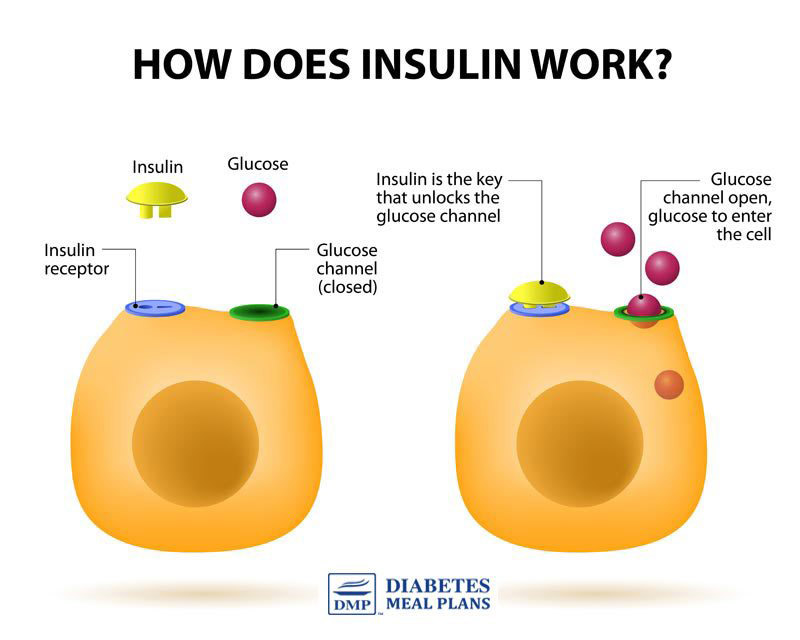
4. Hypoglycemia known as the Somogyi Effect
This is less common but in some people with diabetes, low blood sugar (hypoglycemia) can occur while you are sleeping.
The Somogyi effect is more common in diabetics who are insulin dependent. It’s when your body’s glucose levels decrease quite significantly overnight (nocturnal hypoglycemia) and as a result your emergency system is activated. This sends messages to your hormones and organs to stimulate more glucose production to help raise your levels.
If you’re insulin dependent and trying to identify why your blood sugar is so high in the morning, you might want to wake yourself up during the night to test your levels, just in case this might be your situation and your insulin dose needs to be adjusted, for instance, implementing a long-acting insulin. Or in some cases, people may choose to use a continuous insulin pump.
You can read more about the Somogyi effect here.
5. Poor Food Choices
Poor food choices has a profound impact on your blood glucose and A1c levels, and therefore your early morning levels too.
Regardless of the time of day, poor food choices will impact your glucose levels negatively.
Your goal is to clean up your diet, and stick to eating recommended foods that support good blood sugar control.
6. Poor Overall Glucose Control
If your daily averages are coming in well above the normal healthy range for blood sugar levels, chances are your fasting levels are going to be high as well.
Good blood sugar control means keeping your blood sugar levels as close to normal as possible. And if you can keep them within the healthy range, that’s even better.
You need to know your numbers…
Aim for fasting levels:
- Between 70-100 mg/dL or 4-5.6 mmol/l (optimal)
- 70-110 mg/dL or 4-6 mmol/l (considered good control)
- 70-130 mg/dL or 4-7.2 mmol/l (more liberal, but realistic for many)
- 2 hrs post meal the ideal is under 140 mg/dl or 7.8 mmol/l – the lower your postprandial blood glucose is post meal (for instance 120/ 6.7), the better.
There is some variation in numbers worldwide and your physician may also set you more stringent goals, or more lenient goals.
The point is: keep an eye on your numbers. If you’ve constantly got numbers that are running high during the day, chances are they are going to be even higher in the mornings.
Your goal is to bring your blood sugar levels within a healthy range, then naturally the morning levels do come down as well.
Still, even when you have good control of your daily levels, those morning numbers may still be a little high.
So what can you do? Let’s look at some proven strategies.
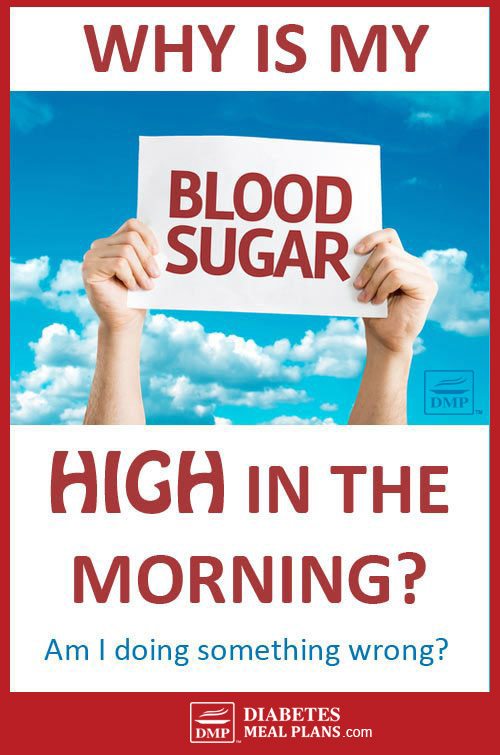
Lifestyle Strategies To Lower Morning Blood Sugar Levels
The truth is, that despite the fact we know the Dawn Phenomenon exists, and worsens morning blood sugar in those with diabetes and prediabetes, researchers still haven’t solved exactly how to lower morning levels.
However, try some of the following methods to see if they work for you. Every person is different and while there is no one proven method for lowering morning levels, many people do report one, or a combination of the following helps.
Apple Cider Vinegar & Cheese Before Bed
One small study found that having 2 tablespoons of apple cider vinegar with 1 oz (28 g) cheese (which is just 1 slice cheese) before bed may help reduce morning glucose by 4% to 6%.
Cheese on it’s own may reduce it by 2% but the acetic acid in the vinegar exerts additional positive influence. The best apple cider vinegar to use is this one by Braggs. If you can’t stomach the vinegar, you can also purchase capsules. As for best cheese, cheddar is one of the best choices here, though you could try other options if you wish.
*NOTE: this tip alone is proving to help many people.
TESTIMONIALS:
“After 2 Tbsp apple cider vinegar & 1 oz cheese last night, my FBS in the morning is 98. It works!” ~Dianne
“I tried the vinegar and cheese before bed. It actually worked. My fasting reading was lower this morning. Thanks!” ~Michelle
Try it yourself: 2 tablespoons of apple cider vinegar (mixed in some water) with 1 oz (28 g) cheese (which is just 1 slice cheese) before bed.

Have a Bedtime Snack
The best type of snack is a protein/fat snack combined, not something high in carbs.
Here are a few ideas:
- A tablespoon of natural peanut butter (great on pieces of celery for some fiber filling goodness)
- A small piece of chicken with avocado or 5 olives
- A small handful of macadamia nuts
- A couple of slices of cheese
Sleep Soundly
Make sure you get a good restful sleep every day because lack of sleep can increase cortisol production (your key stress hormone) and this pushes glucose levels higher. Sleep quality has a big influence on blood sugar levels.
Avoid Alcohol
Although drinking alcohol might seem relaxing it is best to steer clear of it because it’s actually a stimulant and prevents deep REM sleep.
Eat Protein In The Morning
To help bring blood sugar levels down, eat something when you get up but make sure it’s a protein – or a balanced protien/fat/veggie breakfast such as a mixed veggie egg scramble.
If you go and eat loads of carbs for breakfast when your blood glucose is already high, it will only push it up further. The message here is: toast and cereals are often the worst offenders.
Eat Well Every Day
Morning blood sugar levels are all tied up with everything else you do throughout the day.
And one of the best ways to to manage your diabetes or prediabetes is to eat a healthy diet every day – eat the right type of carbs, eat the right amount of carbs, and minimize the most problematic foods – the high carb offenders: sugar, bread, rice, pasta, cereals, and potatoes.
The food you eat has a direct impact on your blood sugar and A1c levels. And the more controlled you can keep your blood sugars overall, the better your morning sugars will be as well.
You’ll find plenty of diet resources on our website. And if you need further help, consider joining as a member.
Supplements to Help Lower Morning Blood Sugar Levels
A variety of supplements have been shown to be effective in reducing fasting glucose levels.
Cinnamon
The average results from two months of cinnamon supplementation at about 3g/day is a reduction in fasting blood glucose by 11.8 mg/dl (0.66 mmol/l).
Polyphenols in cinnamon provide many benefits such as enhancing insulin signaling, improving glucose transport into cells, and reducing insulin resistance.
Chromium
A review of chromium supplementation found that fasting blood glucose can be reduced by 9 mg/dl (0.5 mmol/l) to 31 (1.72 mmol/l).
Researchers suggest this is due to enhancement of insulin action.
Garlic
Taking approximately 300 mg of garlic powder for 8-24 weeks has been shown to reduce fasting blood glucose by approximately 35.8 mg/dl (2 mmol/l).
Researchers suggest garlic helps enhance insulin sensitivity, exerts insulin-like activity, enhances pancreatic beta cell function and inhibits carbohydrate metabolism.
L-Carnosine
L-carnosine 1000 mg per day for 12 weeks showed a 13.1 mg/dL (0.7 mmol/l) reduction in fasting blood glucose levels.
L-carnosine is naturally found in muscle tissue and when taken as a supplement helps modify glucose metabolism, provides antioxidant, protects against glycation and reduces inflammation.
Aloe Vera
A review of aloe vera found a reduction in fasting glucose levels by 46.6 mg/dL (2.6 mmol/l). Aloe vera was either taken by supplement 50-300 mg per day, or juice 15 – 30 mL.
Although the exact mechanisms are unclear, proposed mechanisms include the expression of the genes related to glucose metabolism and reduced insulin resistance. Aloe vera contains over 75 active components, some of which are trace elements of chromium, magnesium, manganese, and zinc that are important in the metabolism of glucose.
Berberine
The effects of berberine on fasting blood sugar levels is very impressive. When people with type 2 diabetes were given 500 mg of berberine per day, 3 times per day, for 13 weeks, fasting blood glucose reduced by 68 mg/dL (3.78 mmol/l).
Berberine has many potent glucose-lowering properties. If you’d like to learn more about it, we’ve written about berberine extensively over here.
Many of the above supplements have also been shown to control blood sugar overall, along with lowering A1c, as well as providing several other benefits.
The best rule of thumb here is not to go out and take every single supplement, but try taking one supplement for a time and see if it exerts any benefits for you. If not you can try exchanging it for another one to evaluate its effects.
Always be aware that any blood sugar lowering supplements can potentially cause low blood sugar (hypoglycemia). You should always seek medical advice before supplementing, especially if taking medications.
Please pin, tweet or share; then keep on reading – thanks!
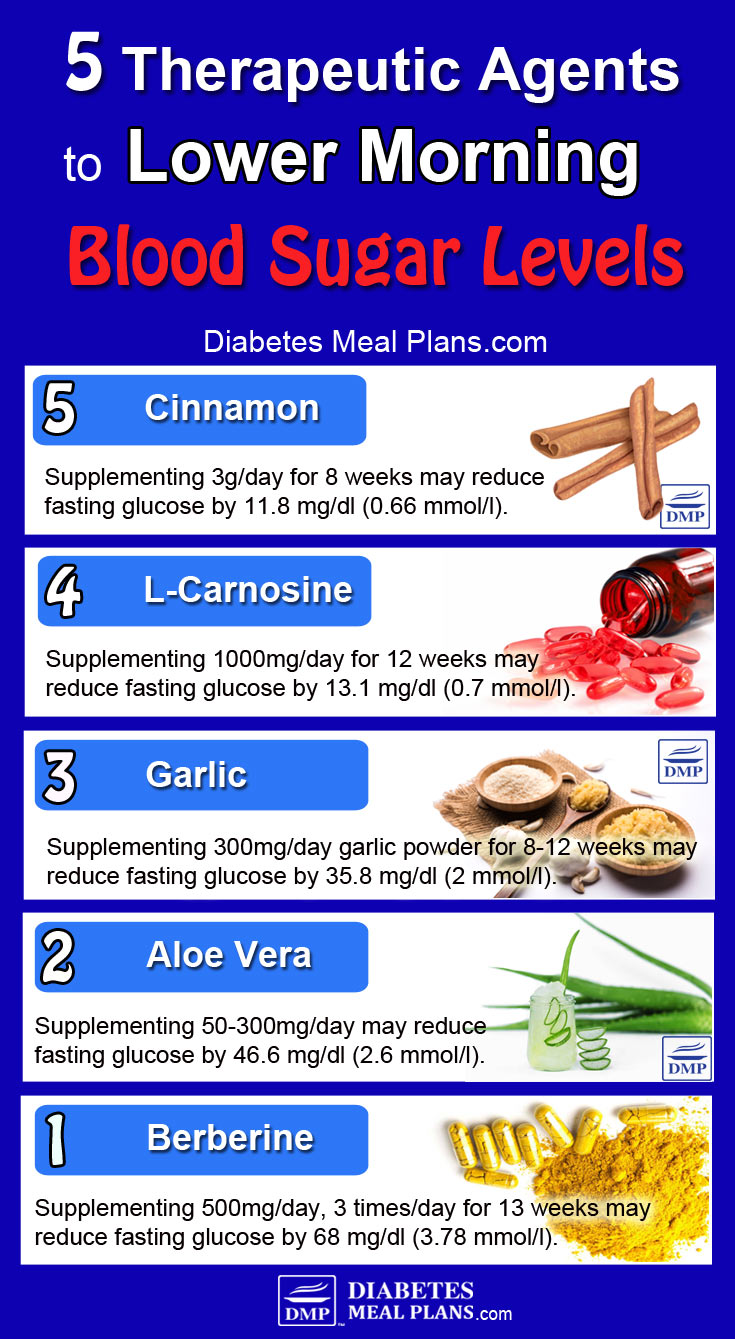
Conclusion
Unfortunately there is no one size fits all solution to solve the high blood sugar in the morning dilemma. Sometimes people can do everything possible and still have morning levels that always come in a little high.
Hopefully in the near future, researchers will uncover a way we can solve the issue more permanently. But in the meantime, the best thing you can do is bring your daily levels down within a healthy range and maintain them there, as this will also influence morning levels.
Second to that you can try some of the strategies above to see if they make a difference for you.
If you’ve found something specific that works for you, please share in the comments below so others can try your tips, too!
YOUR TASK: 21 Day Lower Blood Sugar Challenge™
- Re-evaluate your blood sugar goals – you may already be within the healthy range, and that’s great – keep up the great work so you can keep them there! If you’re not, continue to work toward making diet and lifestyle changes because the more you can regulate your daily levels, the higher chance you have of your fasting levels coming within range.
- Implement some strategies – one of the most useful strategies to lower morning levels is to take apple cider vinegar with cheese at bedtime. We’ve seen this work well for many people. And even participants in the challenge have been trying it with success. See the details above on how to take it.
Commit to yourself and apply what we share because we know what we share can help you get results.
Not part of the challenge?
Want more blood sugar friendly information? Click Here to Subscribe – we’ll keep in touch with nutrition tips, recipes and health updates.Please pin, tweet or share this info to help others – thanks!
TESTIMONIAL: “I used your program after I found out I was Type 2. It has been over a year and with your program and the great information in it, I have been able to keep my A1C at a 6 – it started out around 9.5! Thanks for all your help.” ~Joann B, DMP Member


Are steel cut oats with milk and walnuts a good breakfast choice? Or should I be looking for more proteins?
Hi Georgi, a protein-rich breakfast is ideal and fewer carbs would help to stablize blood sugar levels more, as oats are high in carbs. You might enjoy our recent podcast on breakfast ideas here.
Excellent article. I have FBG on waking (6:30-7:30am) on average of 7.5mmol/L but normal readings during the day and 2 hours after eating so believe by waking early (often at 4-5am for a pee) and going back to sleep my “waking” hormones are causing these high FBG readings?
Also do you know if taking Athletic Greens (AG1) spike your glucose? Many thanks.
Alan (UK)
It definitely sounds like hormones could be the culprit. We see many people have great success lowering FBG readings using apple cider vinegar and/or a fat & protein snack (such as cheddar cheese) before bed.
AG1 appears to have 6g/carbs per serving, depending on what you mix the powder into. This would be considered low carb, so likely not causing a huge spike in your blood sugar however the best way to know for sure is to test. What I would recommend is checking your blood sugar before you consume AG1, consume the drink like you normally would and then don’t eat anything else for 2hrs; check your blood sugar after that point.
I’ve been trying moringa and other herbs to control the blood sugar but it keeps rising. the last reading was 15.1 ,I do excercise everyday and drink a lot of water but no improvement.
What next do i do please?
Focus on your diet/nutrition plan for best results. You might consider taking the T2Diet Program.
I have been drinking Herbaly tea (Wellness Collection) for 2 weeks and I’ve also been eating a few pieces of fennel with peanut butter each morning for the last 4 days and somehow it has lowered my glucose readings by 20-30 points. I even had a fair amount of carbs while out to lunch 2 days ago and checked my sugar 4 hours later and it was 99!!!!!!! I was expecting to see 140!!!!!! Last night, I did a carb challenge again and this morning my sugar was 95 (it had been between 115 and 129 for the past few weeks).
Will sugar free soda and some candy affect my reading in the morning
Definitely possible. Sugar free products, like candy and soda, contain artificial sweetener. Some people find these artificial sweeteners can raise blood sugar, whereas some people are fine using them. In addition to that consideration, it’s also important to remember that sugar free products are often highly processed and contain ingredients that are highly processed which aren’t so great for your health in general. I would suggest eliminating all sugar free products for a week and see if this makes any difference on your morning readings.
Doesn’t a before bed time snack defeat the 12 hour fast timing of FBS?
Not every morning sugar needs to be a true “fasting” blood sugar, so it’s okay to have a healthy bed time snack – especially if you find it improves your morning sugar levels. There may be a time for a true FBS such as when your doctor orders lab work, so on those occasions I would definitely suggest forgoing the snack or eating it early. In general, I suggest trial and error with the snack timing to find what works best for your blood sugar levels.
Great article and very informative. My last few blood tests show 99 fasting and A1c of 5.7. I have been battling stomach issues since January 2021, due to my dentist overprescribing antibiotics, which completely destroyed my gut and intestinal bacteria. I lost nearly 40 lbs and am struggling to gain back at least half this weight. Anyway, I’ve been on a strict diet since January, no sugar, processed foods, low carb, etc…, yet I still got this reading in the AM on my most recent test. I regularly use cinnamon and recently started taking fenugreek and Berberine, but began feeling nauseous so I am now wondering if I’ve gone too far in the other direction?
Are you checking your blood sugars during the episodes of nausea? Nausea could be a sign of both low and high blood sugar so it could be good to see if there is a correlation there, but there might be no relationship. The numbers you describe sound like you have overall good control and I would recommend working on healing your gut (think probiotics & other fermented foods) from the antibiotic therapy, which will likely help the nausea and make weight gain easier.
The breakfast muffins with all your favorite vegetables with 12 eggs and baked at 350 degrees for 25 minutes is the ultimate breakfast. I prep and bake on Sunday and you can eat 2 muffins each day Monday through Saturday. Your blood sugar readings are low and you have vegetables to start your day.
Sounds delicious!
Thank for such wonderfull impormation. Can you be my diatitian
We do not provide 1:1 nutrition counseling services. You may be interested in joining our members site which has access to so many healthy recipes and other support tools.
Do you have a recipe?
Here is a basic recipe but you can add any veggie and cheese combos that you like!
Thank you for the recipe
Going to try making them.
Looking for an informed opinion on Robert Irvine’s Fit Crunch Protein Bars as it relates to sugar content and overall ppropriateness for diabetics. Thanks.